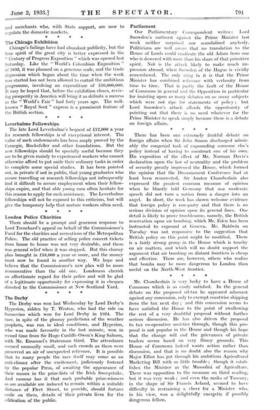There has been one extremely fruitful debate on foreign affairs
when Sir John Simon discharged admir- ably the congenial task of expounding someone else's policy instead of having to construct one of his own. His exposition of the effect of Mr. Norman Davis's declaration upon the law of neutrality and the problem of security greatly impressed the House, which formed the opinion that the Disarmament Conference had at least been resurrected. Sir Austen Chamberlain also expressed the greatest common measure of opinion when he bluntly told Germany that one moderate speech did not turn a nation from a danger into an angel. In short, the week has shown welcome evidence that foreign policy is non-party and that there is no serious division of opinion upon its general lines. One detail is likely to prove troublesome, namely, the British reservation upon air bombing, which Mr. Eden has been instructed to expound at Geneva. Mr: Baldwin on Tuesday was not responsive to the suggestion that British policy on this point might be modified. There is a fairly strong group in the House which is touchy on air matters, and which will no doubt support the argument that air bombing on distant frontiers is cheap and effective. There are, however, others who realize that bombs may be more dangerous to London than useful on the North-West frontier.




































 Previous page
Previous page